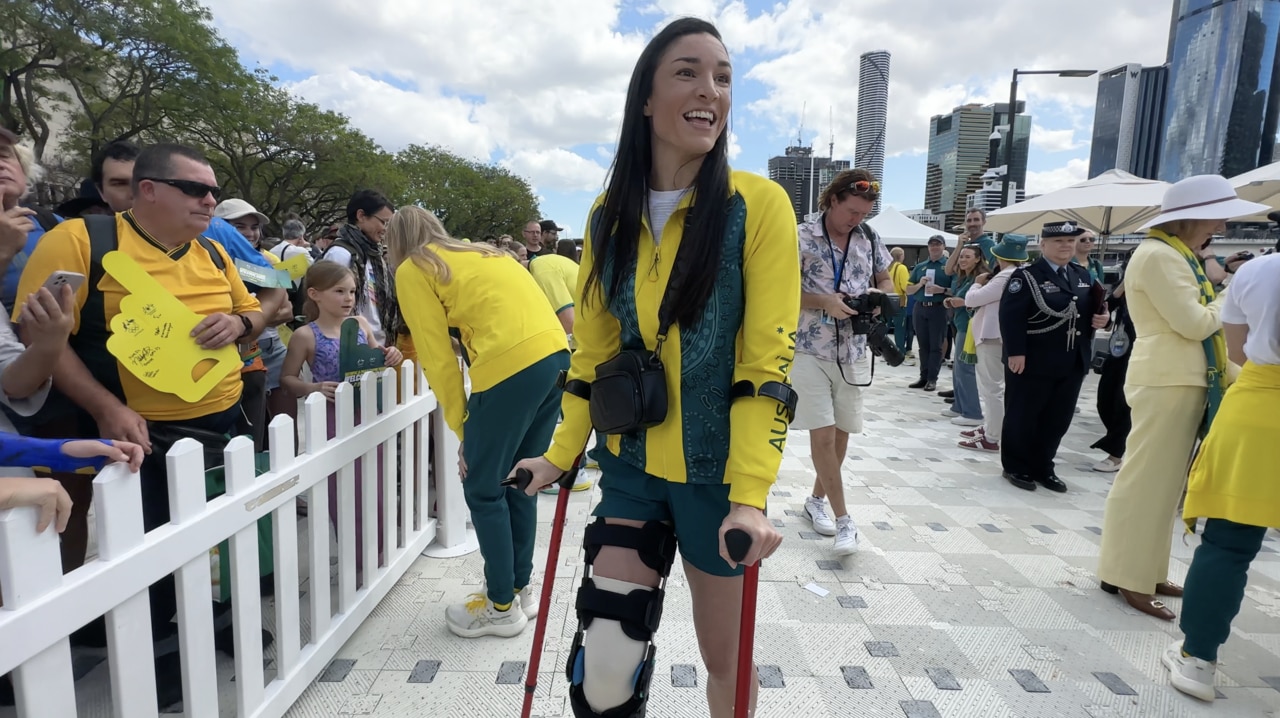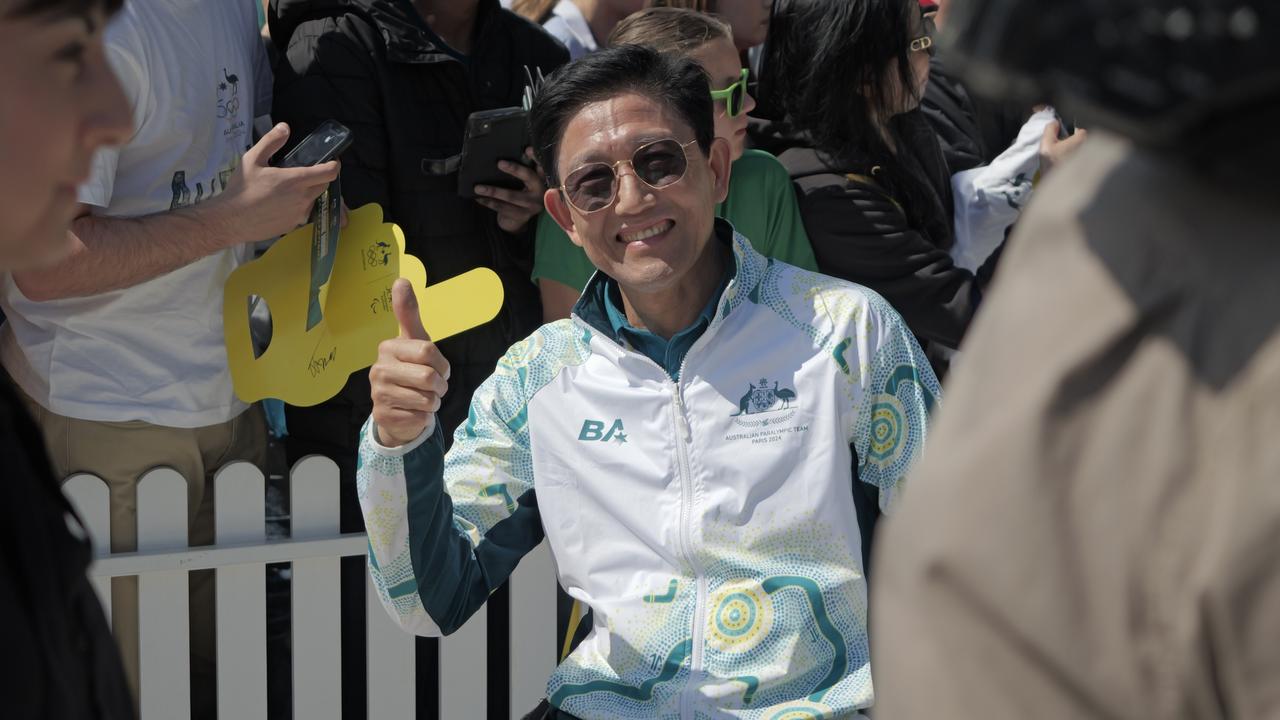Tokyo Paralympics 2021: Incredible numbers behind Australia’s hidden dream team
With no end to the lockdown in sight, record numbers of Australians are now expected to watch the Tokyo Paralympics from Tuesday. Here are the sports to keep a close eye on.
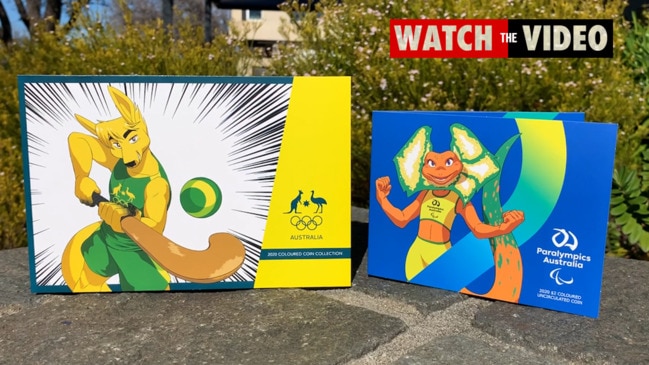
Paralympics
Don't miss out on the headlines from Paralympics. Followed categories will be added to My News.
Whether it’s winning medals, inspiring the nation, or ticking both boxes at the same time, comparing the Australian Olympic and Paralympic teams has become a futile exercise.
As good as our Olympians are, the Australian Paralympic team has got them covered on most fronts, so much so, that it’s not even a fair contest.
Despite having less than half the number of competitors, the Paralympics team usually wins twice as many medals and their backstories are as uplifting and motivating as it gets.
But that’s not a put-down on the Australian Olympic team - which has just provided the whole country with a much needed lift by capturing a record-equalling 17 gold medals in Tokyo - because our Paralympians have been outperforming most Australian sporting teams for decades.

They have finished in the top five nations in the world at every Paralympics dating back to 1996.
Heck, at Sydney 2000, they topped the medal count with a mind-boggling 63 golds. Yes, you read that right - 63 gold medals.
For various reasons, this dream team’s incredible success has partly remained a well-kept secret that most Australians didn’t know about, but not for much longer.
If there’s one silver lining to the heavy restrictions in Australia right now, it’s that millions of people tuned in to watch our best athletes competing at the Tokyo Olympics, drawing inspiration and pride from their performances and the way they presented on the world stage.
With no end to the lockdown in sight, record numbers of Australians are now expected to watch the Tokyo Paralympics, which run from August 24-September 5.
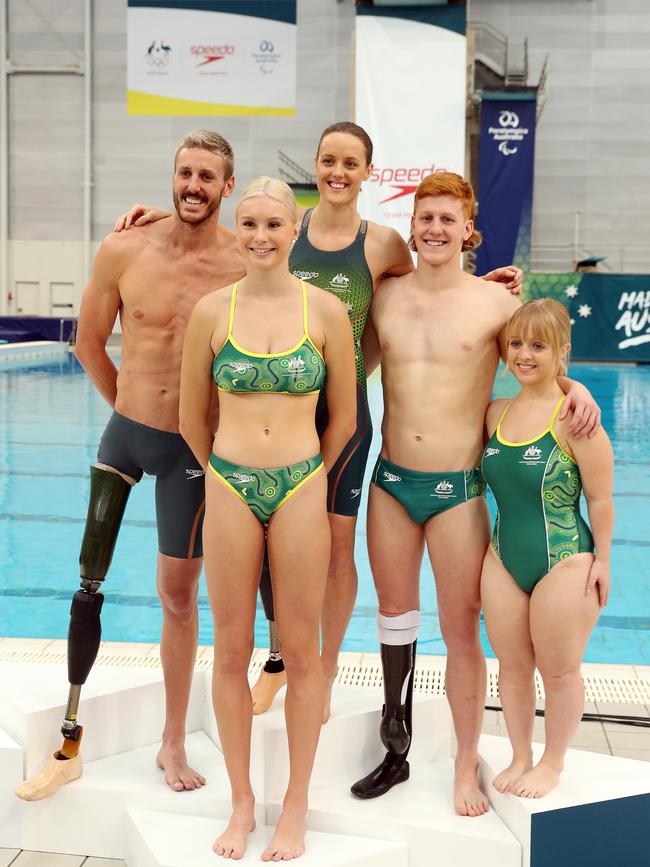
“This is an opportunity for the Paralympic movement to be seen like we’ve never been seen before,” the Australian team chef de mission Kate McLoughlin said.
“I think it’s really going to open people’s eyes to Paralympic sport and just how amazing these athletes are.”
If anything, the stunning success of the Australian Olympic team and the opportunity to perform in front of so many extra eyeballs has heaped more pressure on the Paralympians.
Team officials are well aware of the fickle nature of the many couch potatoes who will instantly change channels if the team isn’t winning but if that’s the price for being in the spotlight, everyone is happy to sign up.
“What a great thing that finally the Paralympic Games is being put on a pedestal,” McLoughlin said.
“That can be hard on the athletes but pressure is good and I’ve got no doubt they will respond.
“They’re amazing athletes in their own right. They are elite athletes and they’re all looking at this thinking that is going to be a turning point for the Paralympic movement in Australia.
“What’s also important to understand is there are going to be young kids in Australia with disabilities who are going to be watching these Paralympics and thinking to themselves ‘that person on the television looks just like me so maybe I can give that a go.’
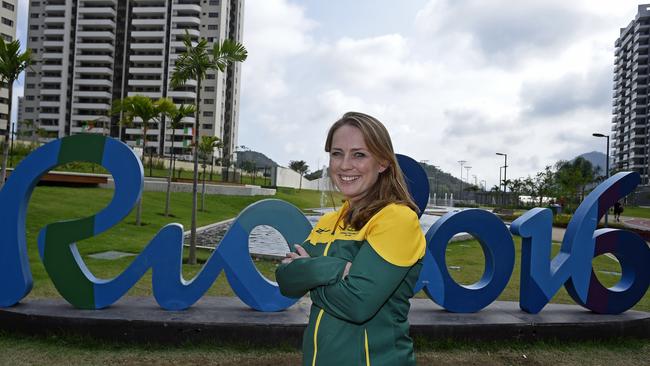
“And some of those same kids will end up representing Australia at Brisbane in 2032.”
There is one thing the Australian Paralympic team would like to emulate from the Olympic team that competed in Tokyo.
No one tested positive to Covid and was forced to miss their event.
It’s been hard enough preparing the team for Tokyo in the midst of the pandemic but the hardest part is still to come so the health of every member remains the top priority.
Taking no chances, Paralympics Australia has put in place strict protocols that are even tighter than what the Olympic team faced.
Only McLoughlin and the two selected flag-bearers will march at the Opening Ceremony. The rest of the team will watch from the Athletes’ Village.
The Australian team has also been banned from eating at the Dining Hall with officials sending 25 pallets of food to Japan to deliver 900 meals a day to the team.
“It‘s awesome that the Olympics went so well and they were so safe but we can’t afford to be complacent,” McLoughlin said.
“We don’t want anything to go wrong. We want everyone to get to the start line and make sure that they get to compete because this is what they’ve trained so hard for.
“Our number two priority is for the team to perform well, which we think they will, and if we keep everyone safe and the team performs the way we think it will, there will be a lot of fantastic benefits that will just flow on from that.
“This has been a really difficult year for everyone, above and beyond the normal challenges everyone faces and we think that will really resonate with the Australian public.”
The 15 must watch events at Tokyo Paralympics
Tue 24 August - Opening Ceremony
Although all of the Australian athletes, bar the flag bearers, won’t be in attendance, the Opening Ceremony promises to be a spectacular and deeply moving occasion, focusing heavily on the struggles the world is facing through the global pandemic. A lot of the details are top secret, including who will light the cauldron, but Tokyo organisers have revealed that the ceremony will mirror the same ‘moving forward’ theme as the Olympic Opening Ceremony.
Wed 25 August - Swimming
As always, the Dolphins are again expected to be one of Australia’s big medal providers at the Games. Unlike the Olympics, when the swimming finals were held in the daytime, the medal races for the Paralympics will all be in the evening. All going well, the Australian team will make a big splash on the opening night of finals with at least half a dozen swimmers in medal contention - including a mouth-watering all Aussie showdown between Ellie Cole and Lakeisha Patterson in the women’s S9 400m freestyle final.
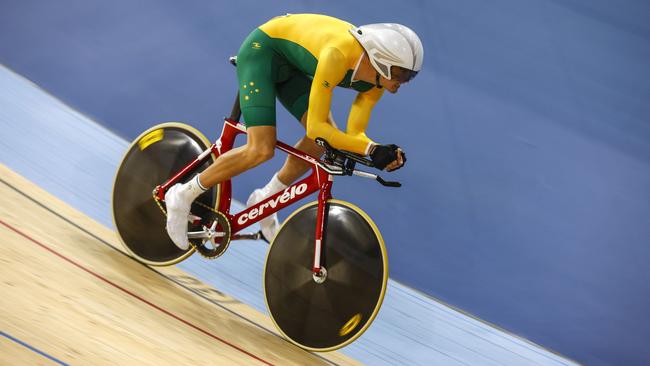
Thu 26 August - Track Cycling
Like the swimmers, the Australian cycling team has high hopes for Tokyo, particularly at the Izu velodrome where the track events will take place. Australia has two really big chances for gold on Day 3 in the men’s individual pursuit titles. David Nicholas, who also competes on the road, is defending the C3 title he won in Rio while amputee Darren Hicks, contesting his first Paralympics, is among the favourites in C2
Fri 27 August - Equestrian
For a country with such a proud tradition in horse riding, it’s staggering that Australia hasn’t won a medal in equestrian since the 2012 London Paralympics. There are just four members on the team in Tokyo but perhaps the best chance of a medal lies with Emma Booth in the individual test. Paralysed after a car accident in 2013, Booth’s dream of riding ponies started when she was a kid watching the television show The Saddle Club.
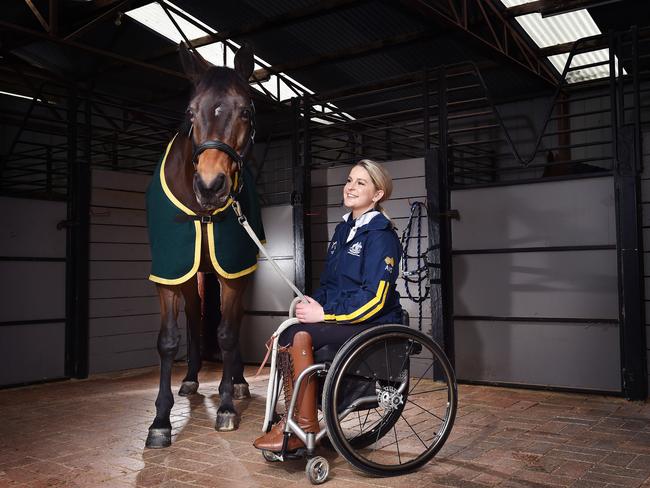
Sat 28 August - Paratriathlon
Para triathlon is spread over two days. The first day is for visually impaired competitors. Australia has a great chance of gold in this with Katie Kelly, who has been legally blind since 2015, won gold at Rio in 2016 and is back to defend her title. Before becoming a champion paratriathlete, Kelly worked for the Melbourne Storm, and was part of the management team when they won the 1999 grand final. When she won gold in Rio, former Storm and Kangaroos coach Chris Anderson was waiting at the finish line to cheer her home.
Sun 29 August - Wheelchair Rugby
One of the blue-riband team events at the Paralympics, the ‘Steelers’ have won the gold medal at the last two Paralympics, clinching back to back titles with a heart stopping 59-58 win over the U.S. in Rio in 2016. The biggest problem the team faces in its bid for a three-peat is how quickly they can gel after being unable to compete and even train together as a full squad during the past 12 months.
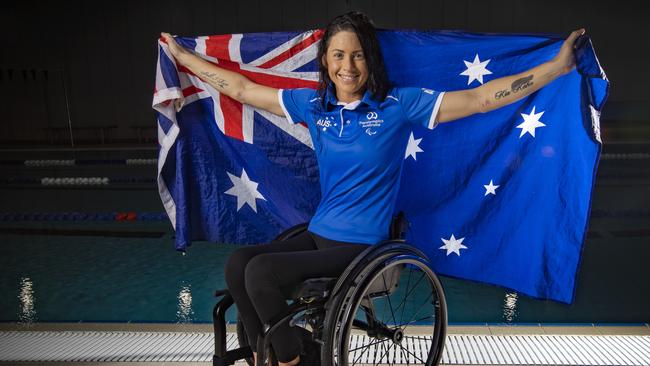
Sun 29 August - Rowing
Erik Horrie has been waiting five long years for this day, even though he is no longer obsessed with winning. A five time world champion in single sculls, the 41-year-old from Penrith is still hunting for an elusive Paralympic gold medal after coming ever so close, winning the silver medal at London in 2012 and again at Rio in 2016 when he was favourite to win. A perfectionist, he initially struggled to accept his second place finish at Rio before seeking mental health support to turn his life around.
Mon 30 August - Table Tennis
Australia hasn’t won a gold medal in Paralympic table tennis for 37 years but there’s real optimism that Tokyo could mark the end of the drought. China has long been the dominant force in the sport but three Chinese champions - Ma Li, Lina Lei and Yang Qian - all moved to Australia after Rio and are now representing their adopted homeland for the first time, and all have genuine medal chances.
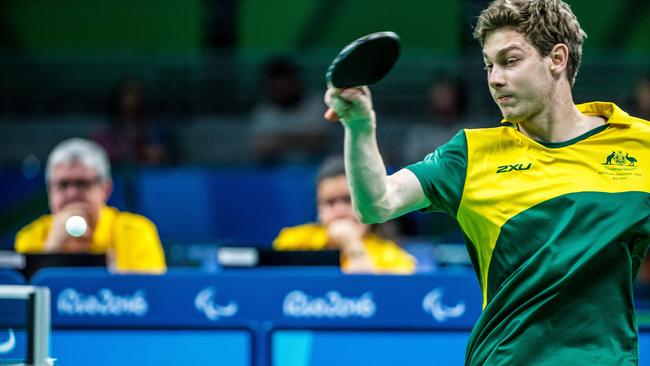
Tue 31 August - Swimming
Grant Patterson has been an Australian crowd favourite for years. Better known as Scooter because he uses a non-motorised scooter to move around, including getting to the starting blocks for his swimming races, he was one of the star performers at the Australian trials in June. He has already won six world championship medals but a Paralympics medal has eluded him. He even thought about returning when the Tokyo Games were postponed but decided to persevere and has real hopes in the 50m breaststroke.
Wed 1 September - Wheelchair Tennis (doubles)
This could be the surest gold medal of all in Tokyo but let’s not count our chickens first. They don’t play together that often but when they do, there’s no escaping the fact that Dylan Alcott and Heath Davidson are an almost unbeatable combination on the tennis court. They first teamed up in 2016, winning the World Team Cup, then winning gold in the quad doubles at Rio. They have also won the Australian Open each of the last four years.
Thu 2 September - Wheelchair Tennis (singles)
If you want to catch a bit more of Dylan Alcott then be sure to tune in for the singles medals matches where he’s defending yet another of his many titles. Of course there are no guarantees he’ll win again but he’s made such a habit of it, it’ll be a major shock if he doesn’t. His 14 grand slam singles title and more than double the next most by anyone in the men’s quad. Britain’s Peter Norfolk is the only man to win the Paralympic quad singles title more than once.
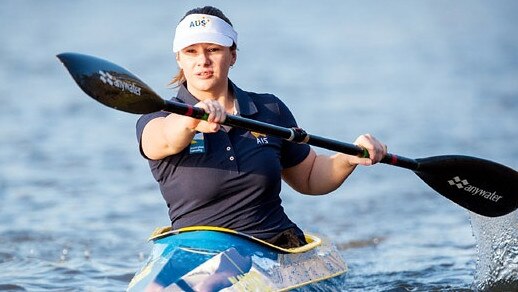
Fri 3 September - Road Cycling
Alistair Donohoe is a rare breed in cycling because he’s won major international medals both on the track and on the road. He’s a three-time world champion in road race and one of the favourites for gold in Tokyo. His right arm is impaired after a freak accident when he was a teenager and his arm got caught in a rope tied to a tree when he was trying to jump into a creek.
Sat 4 September - Paracanoe
If you haven’t heard about or seen Curtis McGrath in action then tune in because he’s all-action. A former soldier who lost both his legs to a mine blast while serving in Afghanistan he‘s become a formidable force in canoe and kayak, racking up 10 world titles and a gold medal at Rio, which he is defending in Tokyo. He was chosen to carry the Australian flag at the Closing Ceremony.
Sun 5 September - Wheelchair Basketball
After winning gold medals in 1996 and 2008, the men’s wheelchair basketball team - the Rollers - missed out on the podium altogether in Rio. The women’s team - the Gliders - have never won a gold but won medals at each Paralympics from 200-2012 before failing to qualify for Rio. The two Australian teams are back for Tokyo and are quietly optimistic that at least one - if not both - will be there at the end.
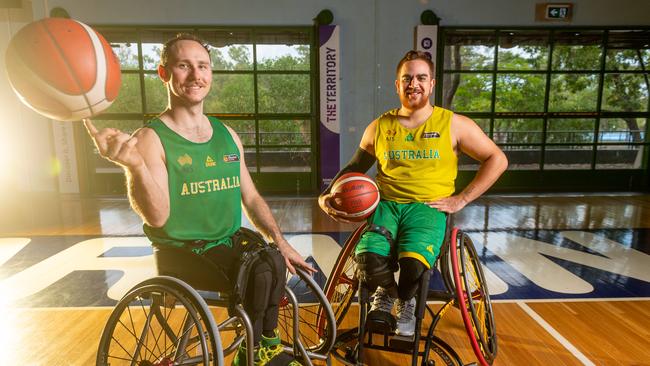
Sun 5 September - Marathon
The Olympics moved each of the marathon races out of Tokyo to Sapporo to avoid the humidity but for the Paralympics, the signature races will be in the Japanese capital. It will mean an early start for everyone involved but there are five Aussies competing in the five marathon classes including blind runner Jaryd Clifford and amputee Michael Roeger and wheelchair racer Christie Dawes, one of the Australian team co-captains.
The havoc getting Paralympic team to Tokyo
No one ever thought it was going to be easy but the job of getting the Australian Paralympic team safely in and out of Tokyo has become a colossal and expensive exercise.
Officials estimate that the bill for sending the team to the Games has ballooned by another $3 million, draining the already limited funding that is given to Paralympic sports.
Although one-fifth of Australians have a disability, Paralympic sports receive less than 20 per cent of the overall funding given to sport, so every extra dollar spent hits the bottom line hard.
A lot of the money that would have been spent on overseas travel was reallocated to organising domestic events during the 12-month postponement but the recent state border closures and lockdowns have caused endless problems with the team’s preparations and the cost of flying everyone to Japan.
New charter flights had to be arranged while training camps that were booked a year ago were cancelled at the last minute because athletes couldn’t get to them.
Worse still, dozens of athletes were left scrambling for exemptions just to be allowed to continue their preparations at home because they were not supposed to leave their front door.
Five-time world champion rower Erik Horrie, one of the favourites to win the singles sculls, needed special permission to continue at Penrith and he was just one of many who were impacted.
Incredibly, some teams haven’t been able to train together for over a year and the first time they will actually be in the same place at the same time will be once they arrive in Tokyo.
“The lockdowns have caused havoc, trying to get athletes across borders quickly,” the Australian team chef de mission Kate McLoughlin said.
“Getting quarantine locked in has also been really difficult, trying to work out where charter flights need to come in.
“It’s just a lot of that logistical stuff that normally we would have nailed 12 months ago.
“It’s been very difficult for a lot of our athletes but to be fair to them, they haven’t whinged, they’ve just got on with it.
“They’ve had to deal with a lot, above and beyond the normal challenges they face, because there’s just been a constant need for agility and for out of box thinking so everyone is at the stage where they can’t wait to do this thing because they’re ready.”
Originally published as Tokyo Paralympics 2021: Incredible numbers behind Australia’s hidden dream team


